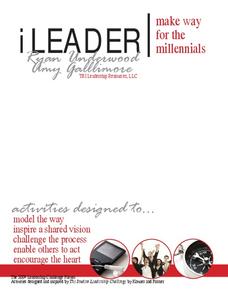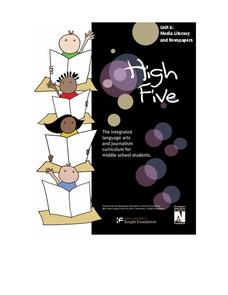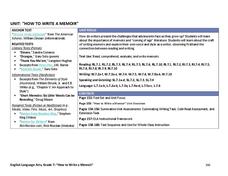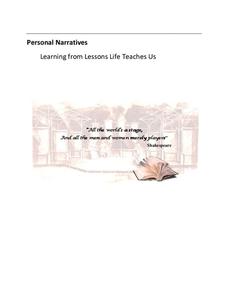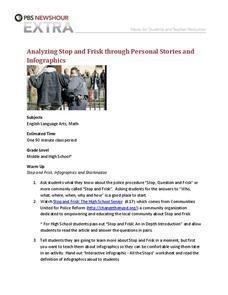Social Media Toolbox
Cyberbullying
What can we do to make our school community more aware of cyberbullying? From The Social Media Toolbox, lesson 10 of 16 takes on the tough topic of bullying. Learners research cyberbullying through online research, then create an...
Social Media Toolbox
Social Media Roles
Social media has changed the news publishing process, so how does it affect school news publications? Lesson nine in a 16-part series titled The Social Media Toolbox explores the traditional publishing roles through the lens of social...
Social Media Toolbox
A Look at Social Media Policies
Should school news publications use social media if their district is against the use of social media in school? Pupils ponder the policy, then examine their publication's plan in parts seven and eight of a 16-part Social Media Toolbox...
Social Media Toolbox
Law Review
How can your journalism class ensure they use social media responsibly and legally? The sixth lesson in a 16-part Social Media Toolbox series asks pupils to dig deep into the legal aspects of social media use by school publications....
Social Media Toolbox
Social Media Usage
Is there a difference in the way organizations present news via social media and in print? The third in a series of 16 lessons from The Social Media Toolbox explores news outlets and their delivery methods. Groups follow a story for a...
Social Media Toolbox
Why Social Media?
Is social media the best way to convey news in your school? Young journalists dig deep into the social media question in the second of 16 lessons from The Social Media Toolbox. After learning about the relationship between social media...
Social Media Toolbox
Ethical Decision Making
When faced with a dilemma, how do journalists decide how much news to use? Social media scholars explore the philosophies of ethical resolution in the first of a 16-part Social Media Toolbox series. Partnered pupils use a Potter Box to...
Leadership Challenge
Inspire Students Today to Make a Difference in the Future
Your search for a year's worth of leadership lessons is over! A lesson in a character education series provides a full two semesters of inspiring leadership activities. The resource includes individual and group challenges to ensure a...
American Press Institute
Media Literacy: Where News Comes From
What actually happens at a press conference? Make sense of the mayhem with a mock press conference activity designed to promote media literacy. Individuals participate as either members of the press or the governor's office to examine...
Leadership Challenge
Mark Your Calendar
Do your actions reflect your values? Scholars examine their day-to-day activities versus their passions during the eighth installment in a series of 12 character-building lessons. After defining their values, participants create...
Leadership Challenge
Rock the Clock
Watch young leaders as they totally rock this activity! Pupils partner up and set appointments with one another during the third in a series of 12 character-building lessons. Instructors call out the appointment time, then partners meet...
American Press Institute
High Five: Media Literacy and Newspapers
Teach the five different types of media with the first of three in a media literacy unit. Learners create and propose a final newspaper project, which must address information covered throughout the unit.
American Press Institute
High Five: Go to Press
High school scholars learn valuable information about how to run a newspaper in the third and final installment of a media literacy series. The unit scaffolds learners to success with background information before they plan for...
Louisiana Department of Education
How to Write a Memoir
Who are we and what shapes our identities? Seventh graders work to answer this question as they learn how to write a memoir. Full of non-print resources and supplemental texts that range from fiction to non-fiction, scholars write their...
National Park Service
Maltese Cross Cabin
The Maltese Cross Cabin, a frontier residence of Theodore Roosevelt, is a time capsule that commemorates Roosevelt's time in the Dakota territory. An explanatory video and response guide takes students on a virtual tour of the wooden...
Library of Congress
Thomas Jefferson's Library: Making the Case for a National Library
The United States Library of Congress, the largest library in the world. But such was not always the case. The library was destroyed during the War of 1812. In a persuasive letter to Samuel H. Smith, Thomas Jefferson offered to sell his...
Thoughtful Education Press
Personal Narratives: Learning from Lessons Life Teaches Us
"First Appearance," Mark Twain's tale about overcoming stage fright, serves as a model of a personal narrative and gets young writers thinking about milestones in their own lives. After examining student models and considering the...
National Library of Medicine
Your Environment, Your Health: The Great Debate—Bottled Water vs. Tap Water in Our School
Should bottled water be sold in schools, or should they only provide tap water? The summative unit in the six-part series encourages scholars debating this topic. The lessons teach how to build an argument, how to gain background...
Towson University
Mystery Tubes
How do scientists know they're right? Truth be told, they don't always know. Explore the scientific process using mystery tubes in an insightful activity. Young scientists discover how to approach and solve problems in science, how ideas...
Worksheet Web
Language – Debating
Having a debate doesn't mean you're fighting. Introduce middle schoolers to debate with a resource which distinguishes between an quarrel and a debate, describes the debate process and format, and presents some possible debate topics.
The New York Times
The One-Question Interview
Generate interest in current events, the theme of a new unit, or a research project. Individuals select a question from the list generated by the class, conduct one-on-one interviews, analyze the responses, draw conclusions based on...
PBS
Analyzing Stop and Frisk Through Personal Stories and Infographics
How much can you learn about an important topic from a single image? High schoolers analyze an infographic that represents the number of stops performed during the Stop and Frisk police procedure. After building background information...
C-SPAN
Electoral College Pros/Cons and Alternatives
If every vote counts, why do we need the electoral college? Middle and high schoolers study the Constitutional precedent of the electoral college, as well as its place in historical and modern elections, with an engaging social studies...
C-SPAN
Debates
How do the presidential debates of 2016 compare to the debates from the 1980's? What about the 1960's? Evaluate a chosen candidate or issue from the 20th and 21st centuries with a lesson plan focused on political debates. Middle and high...












